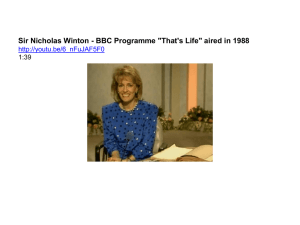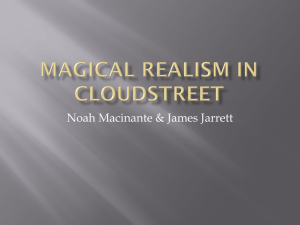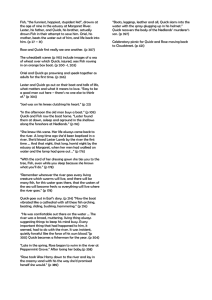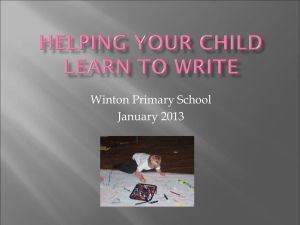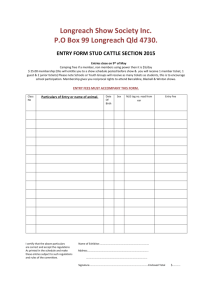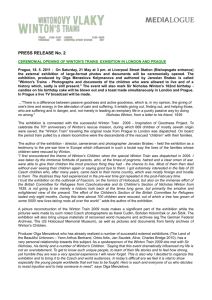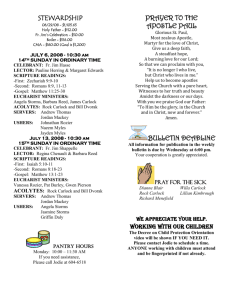“Don`t be bitter, be better” (Minimum of Two) It excited him to
advertisement
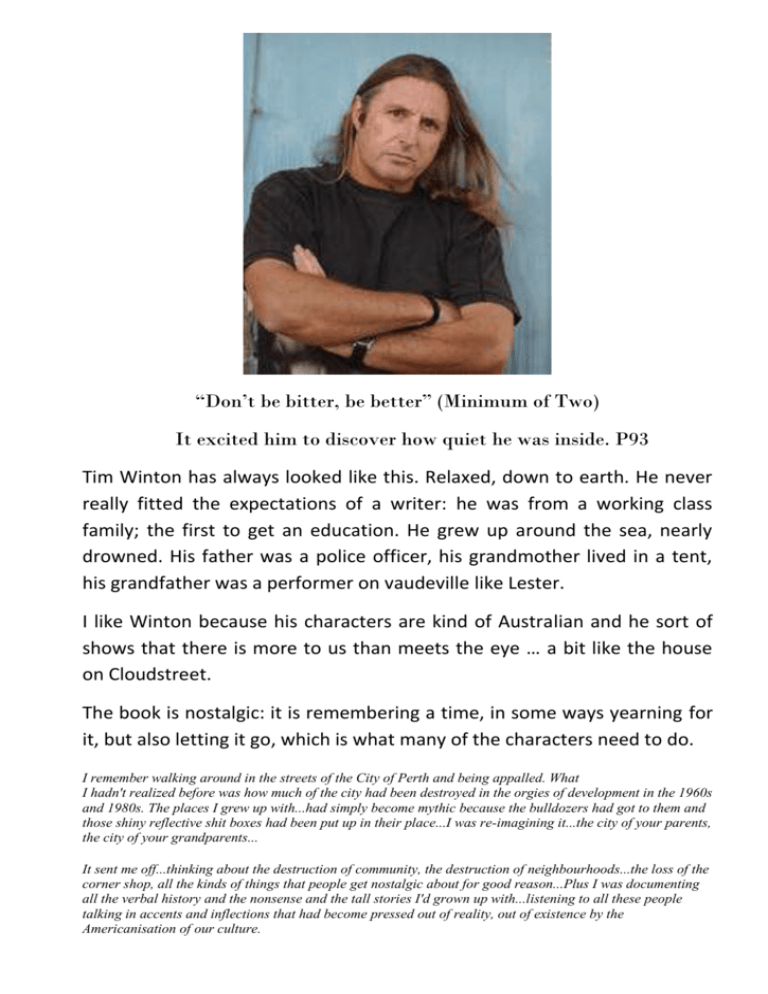
“Don’t be bitter, be better” (Minimum of Two) It excited him to discover how quiet he was inside. P93 Tim Winton has always looked like this. Relaxed, down to earth. He never really fitted the expectations of a writer: he was from a working class family; the first to get an education. He grew up around the sea, nearly drowned. His father was a police officer, his grandmother lived in a tent, his grandfather was a performer on vaudeville like Lester. I like Winton because his characters are kind of Australian and he sort of shows that there is more to us than meets the eye … a bit like the house on Cloudstreet. The book is nostalgic: it is remembering a time, in some ways yearning for it, but also letting it go, which is what many of the characters need to do. I remember walking around in the streets of the City of Perth and being appalled. What I hadn't realized before was how much of the city had been destroyed in the orgies of development in the 1960s and 1980s. The places I grew up with...had simply become mythic because the bulldozers had got to them and those shiny reflective shit boxes had been put up in their place...I was re-imagining it...the city of your parents, the city of your grandparents... It sent me off...thinking about the destruction of community, the destruction of neighbourhoods...the loss of the corner shop, all the kinds of things that people get nostalgic about for good reason...Plus I was documenting all the verbal history and the nonsense and the tall stories I'd grown up with...listening to all these people talking in accents and inflections that had become pressed out of reality, out of existence by the Americanisation of our culture. Winton doesn’t like everything about modernity and certainly picks up on this when he writes about Perth and the sinister aspects of the Swan river. He seems to be observing a place in the process of transformation and also the people in that place. While Winton knows that you can’t “live in the past”, there are things that it can teach us. It has value and for many of his characters it resonates throughout their lives. As you know, different characters including the house at Cloudstreet, are haunted. Nonetheless, I think Winton appreciates the optimism (Sam/ Lester), sense of community (Oriel/Lester, Cloudstreet), resolve/determination (Oriel) that seems to be present. “New” Australia : past versus present past and present Rose …. “didn’t care or know much about politics; she just hated Australians who tried to be English” Rose and Toby can’t work because he is too pretentious and aspiring to be something that is not natural to the place. Despite aspiring to be like him in terms of class/status/education, she sees through him. Novel is finding/creating it’s own unique voice, style. Making sense of it’s own experiences. Australia is acknowledging/creating it’s own story: both the ugly bits and the triumphant bits This reinforces the uniqueness of the experience. The book was published/written around Australia’s bi centennial and Winton is very aware of the positive and negative parts of our history. He is much more aware than people like Sam about aboriginal displacement and is endorsing the idea that we need to respect, understand and protect the spirit of a place as did the aboriginals. Perhaps the challenge is to get the “mix / blend” right : Quick and Rose are honest/openly vulnerable and supportive juxtaposing the older couples who are rarely intimate about their fears/failings. For Winton, it seems the secrets people (or places) keep haunt them or hold them back. Continuity / Resilience / Family / Support / Empathy = hope for Winton as people/places “heal” when they acknowledge the pain of the past. Key Themes: Death Loss Family Empathy Resilience Struggle Change Identity Problems faced: Loss of loved ones Loss of self Family breakdown/dysfunction Loss of faith/identity Financial hardship A lot of sad people on the wall, Quick. What’re you doin with em? What’s it mean?“ Quick said nothing. Knocks me around to see you like this boy. You’ll starve to death. Look at these poor sods – you don’t wanna be like them. You don’t need to be. You’ve got a roof over yer head, family – well we’re not much I know, he chuckled. (P93) Lester then cracks it a little at Quick : And then the old man’s voice got quiet and dangerous. You and me we understand about Fish. We were there. We were stupid enough to drown him tryin to save him. You remember that. We owe him things, Quick. We got a debt …. Don’t you forget about Fish, boy. Not as long as you live, or your life won’t have been worth livin’. (93-94) In this passage, there are several things worth noting that set up a sense of what Cloudstreet is about. Dialogue/use of slang = Australian. Winton locates the piece in a particular place and time: references to places, products and mindsets that don’t exist anymore abound Family: Lester is trying to help Quick see what he has, how fortunate he is …. This is also a little ironic as the Lambs have struggled with the loss of Fish, the loss of Faith and the loss of place/home. Goodwill: Lester “chuckles”, tries to always keep things positive, honest and straightforward. He is immensely frustrated but there is goodwill in his nature. Guilt/Change/Loyalty: Reminding Quick of his debt to Fish, the importance of kinship and support. It’s interesting that the line reminds Quick not to live a life of regret, to live fully as we will discover that the narrator, Fish recalls all there is to lament and celebrate about life just moments before he dies. But in a sense, when Fish flings himself into the water, his death also functions as a rebirth and a reunion with himself: he is whole again, articulate, engaged and conscious of everything. Perhaps in this way Winton introduces the idea of continuity. Style - Mostly 3rd person/Fish goes to 1st person Magical realism- some strange unexpected/unbelievable events occur Colloquial language Symbolism: water Biblical references Set in an Australia that is emerging and is in the process of “becoming” / changing much like many of the characters, particularly Rose and Quick who are rising/emerging / developing from the narrative as connected, mindful, sensitive and strong despite the pains they have endured. In both life and death, novel celebrates the interconnection of beings. Water seems a chief symbol : both families have it in common, live close to it and are sometimes out of their depth. Rose: hardy, thorny, tough, beautiful metaphorically abandoned/ignored/rejected by mother. Scarred by past. Struggles with anorexia. Dolly’s promiscuity leads to Rose’s loss of innocence when she hears her having sex on the day of Sam’s accident. Quick conscience/new perspective/different outlook on Nedlands monster. Irony : not as “slow” as people think … That’s the sight of the world ending, someone’s son dead. Then it hits him. That’s my brother. This is my life over again Fish: Lost yet “present”. Articulates the feelings. Understands even though he cannot communicate. Lester and Oriel: Grieving/resilient/supportive. Lost their meaning/lost Fish and God at same time. Lester seems to be the emotional glue, Oriel the drive and energy of house and neighbourhood: maybe masking her grief. Lost her “mind country”. Hard woman but generous to lots of people. Winton perhaps celebrates her uniqueness. Maybe Rose represents an evolved version of Oriel? Sam: unlucky, handicapped, larrikin, joker, well meaning but foolish. Funny: bird is a crack up. Lester understands him immediately. (Great quote when they meet for the first time: “Lester sees the pink stumps and reads grief in the man’s face. He knows what it looks like. He only needs a mirror” p49) Dolly: sexualised, alcoholic, victim of abuse. Has dreamt of getting away : rail road tracks = escape, but she is trapped by her past. ( No, she never did find out about those rails. But nothing ever turns out like you expect. Like how your father ends up not being your father, and all.” P79) Inverse of saying “Only a mother could love you”- very hard to connect with, but loss of her son and discovery of her secret slowly changes our perception. Wants to reinvent herself for grandson (Wax Harry) – family is both her undoing and her ‘saviour’ Wax Harry: new generation/ product of the 2 families/ the new centre and focal point. Cloudstreet: bad vibe, divided but transforms spiritually when it is filled with love. The scene when Quick and Rose in the library literally shakes the spirits away and their ‘sudden love remains in the room, hanging like incense’ (p314) Becomes a new centre and hub. Ultimately triumphant place. For Winton, families are not perfect and they can, in fact, do amazing damage. Nonetheless, it is not always bad and they can and do provide the instances that make life worthwhile and wonderful and you just can’t ignore these moments. “Quick thought about it. They lived like some newspaper cartoon – yokels, bumpkins, fruitcakes in their passed down mended up clothes, ordered like an army floorshow. They worked their bums off and took life seriously: there was good and bad, punishment and reward and the isolation of queerness. But there was love too, and always there was music and dancing and jokes, even in the miserable times after Fish drowned.” (p304) Stuff to do: In presenting …. as …. Winton juxtaposes ……. with ……… in order to …………. Winton’s use/reference to ….. is also a symbol for …….. Find Examples: The house in Cloudstreet Family/individual pain What a main character may have in common What motivates characters Evidence of transformation How the couples are similar/different The moments of joy/connection Topics (from web) “In Cloudstreet, Winton shows that the effects of grief are rarely short-lived or easy to resolve.” Do you agree? _______________________________________________________________ Human beings often struggle to make meaning of their lives. Discuss the development of this idea in Tim Winton’s Cloudstreet _______________________________________________________________ "Cloudstreet dwells on the human desire to find meaning in life." Discuss _______________________________________________________________ "Cloudstreet by Tim Winton explores the relationship between family and identity." _______________________________________________________________ "How is cultural identity represented in Tim Winton's Cloudstreet?" _______________________________________________________________ "In Cloudstreet tragedy and loss are overcome by hope and forgiveness." Discuss _______________________________________________________________ "Cloudstreet is very Australian but has a universal significance. Do you agree? _______________________________________________________________ "The values portrayed in Cloudstreet are very endearing because they no longer exist." Do you agree? _______________________________________________________________ "Rose and Quick's wedding is an important event in Cloudstreet. How does Tim Winton use it to reflect some key concerns in the text? _______________________________________________________________ "Cloudstreet shows that the supernatural is a normal, every day experience that enables us to find out who we are and where we belong." Discuss _______________________________________________________________ "Cloudstreet is as much an historical text as it is spiritual." Discuss _______________________________________________________________ "Ultimately in Cloudstreet, it is the representation of intense human relationships that captivates the reader." Discuss _______________________________________________________________ "Besides providing an interesting story line, texts portray attitudes and values connected with many aspects of the society in which they were written or represent." Discuss in relation to Cloudstreet. _______________________________________________________________ “Go on with your life, love. It’s all there is.” Cloudstreet depicts characters who continue to live in the face of suffering that threatens to engulf them. Discuss. _______________________________________________________________ “In Cloudstreet, Winton shows that the effects of grief are rarely short-lived or easy to resolve.” Do you agree? _______________________________________________________________ “The world was a sad, miserable place and soon it’d be no place at all.” Cloudstreet contains characters who revel in their own suffering. Discuss. ______________________________________________________________ ‘In Cloudstreet tragedy and grief are overcome by hope and forgiveness.’ Discuss. ______________________________________________________________ ‘Cloudstreet is very Australian but has universal significance.’ Discuss. ______________________________________________________________ ‘In Cloudstreet Winton demonstrates that there is no single religious path to enlightenment, but many possibilities for achieving this goal.’ Discuss. ______________________________________________________________ ‘The two families of Cloudstreet live out microcosmic versions of the potential for harmony in the wider world.’ Discuss. ______________________________________________________________ ‘Cloudstreet is an allegory or morality tale. It is not meant to be read literally.’ Discuss. ______________________________________________________________ ‘In Cloudstreet all the ends are tied up too neatly to be realistic.’ Discuss. ______________________________________________________________ ‘The significance of a dimension beyond the everyday, temporal one is a central tenet of Cloudstreet.’ Discuss. ______________________________________________________________ ‘Cloudstreet demonstrates the potential for breaking patterns of destruction.’ Discuss. ______________________________________________________________ ‘Cloudstreet illustrates the role of culture in making people feel psychologically and emotionally at home’ Discuss.
